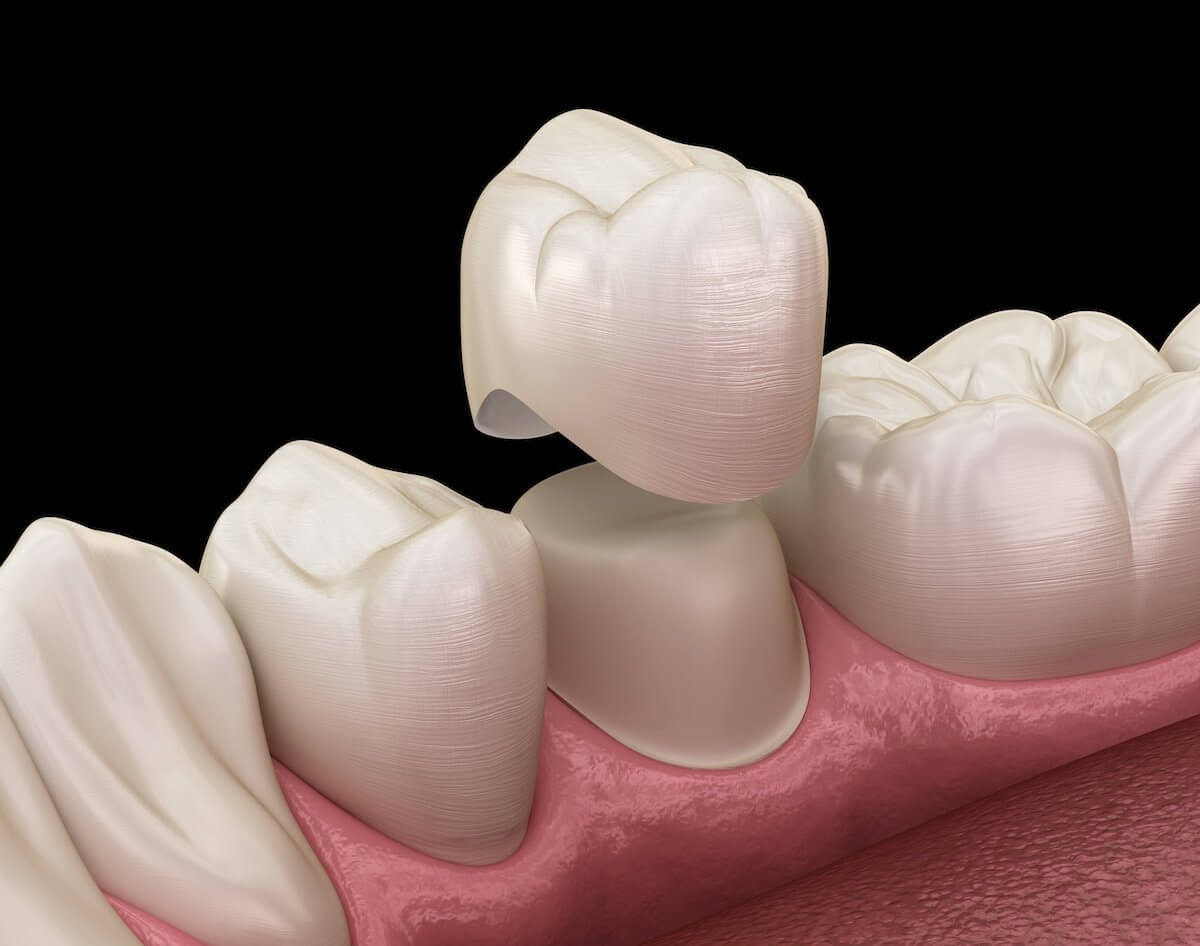Dental crowns are a versatile option for restoring damaged, weakened, or cosmetically compromised teeth. Also known as dental caps, they seamlessly blend with your natural smile, ensuring both optimal function and aesthetics. But with a variety of materials available, choosing the right one can feel overwhelming. Fear not! As dental professionals, we’re here to help you understand your options and make the best choice for your smile. Let’s dive in!
Understanding Dental Crowns: Repairing, Strengthening, and Transforming Your Smile
Dental crowns serve two primary purposes: restoration and aesthetics. They’re permanently cemented onto a damaged or weakened tooth, essentially becoming its new outer layer.
The process of getting a crown involves several key steps:
- Consultation and Examination: The first step is assessing your tooth’s health and discussing your concerns. X-rays or other imaging might be necessary to evaluate the root and surrounding bone.
- Preparing the Tooth: Your dentist will remove a thin layer of enamel from the damaged tooth to accommodate the crown. Anesthesia ensures minimal discomfort during this process.
- Impression and Temporary Crown: Next, they’ll take a precise mold of your prepared tooth to create a custom-made crown. Meanwhile, a temporary crown protects the tooth until the permanent one is ready.
- Cementation and Finalization: Once the permanent crown is crafted, your dentist will carefully check its fit and color. If everything aligns perfectly, it’s permanently cemented onto your tooth. Minor adjustments might be needed for optimal comfort and function.
The Benefits of Dental Crowns
The benefits of dental crowns are numerous and include:
- Strength and Stability: Crowns reinforce weakened teeth, protecting them from further damage and potential fractures.
- Improved Functionality: They restore a tooth’s chewing ability, letting you enjoy your favorite foods without discomfort.
- Enhanced Aesthetics: Crowns address cosmetic concerns like cracks, chips, discoloration, and misshapen teeth, boosting your confidence in your smile.
How Long Crowns Last
With proper dental hygiene and regular checkups, crowns last 10 to 15 years (or even longer). However, factors like material choice, chewing habits, and overall oral health can influence their longevity.
Choosing the Right Material
Selecting the ideal crown material requires careful consideration of various factors. The tooth’s location — front, back, or somewhere in between — plays a crucial role. Front teeth benefit from aesthetically pleasing materials like porcelain that mimic natural tooth color and translucence. Conversely, back teeth benefit from the strength and durability of metals or zirconia because they are used for chewing.
The extent of damage also plays a role in this decision. Severely broken teeth might require stronger materials like metal alloys, while minor chips or cracks could be addressed with more aesthetic options like porcelain. Ultimately, your personal preference is usually the deciding factor. Do you prioritize superior strength or lifelike aesthetics? Or are both equally important? Discussing your desires, preferences, and concerns with your dentist allows for a collaborative decision that aligns with your unique needs and budget.
Let’s take a look at crown materials:
- Metal Crowns:
- Subtypes: Gold, palladium, chromium-cobalt alloys.
- Pros: Unmatched strength and durability. Excellent biocompatibility (allergic reactions are rare).
- Cons: Less aesthetically pleasing compared to other options. Metallic color might show through porcelain. Potential for metal sensitivity in some individuals.
- Porcelain-Fused-to-Metal (PFM) Crowns:
- Metal base covered with lifelike porcelain.
- Pros: Strong and durable. Good aesthetics due to the porcelain layer.
- Cons: Metal base can sometimes show as a dark line near the gumline. Porcelain chipping is a possibility.
- All-Ceramic/Porcelain Crowns:
- Subtypes: Zirconia, lithium disilicate, feldspar porcelain.
- Pros: Excellent aesthetics thanks to natural-looking translucence. Biocompatible. Good strength.
- Cons: Slightly less durable than metal. Might be more expensive depending on the specific material.
- Resin Crowns:
- Made entirely of tooth-colored resin.
- Affordable. Can be placed in a single visit.
- Cons: Less durable than other materials. Prone to staining and chipping. Primarily used as temporary crowns.
Remember: This is just a brief overview. Each material has its nuances, and the best choice depends on your unique situation
Working with Your Dentist
Choosing the right crown material is a collaborative journey. Your dentist is your invaluable partner and will help you make the right decisions based on your individual needs and aesthetic desires. Discuss your concerns, preferences, and budget openly. They will explain each material's pros and cons in the context of your needs to guide you toward the perfect solution.
There’s no “one-size-fits-all” answer. By fostering open communication and shared decision-making, you and your dentist can craft a personalized treatment plan that delivers a smile that radiates both health and confidence.
Wrapping Up
Choosing the right crown material hinges on understanding your needs and preferences. Consider the tooth’s location, the severity of damage, aesthetic desires, budget, and insurance coverage. Remember, there’s no single “best” material when it comes to dental crowns. The optimal choice lies in collaborative decision-making with your dentist.
As trusted dental professionals, we believe in fostering open communication and shared decision-making. When you choose us for your oral healthcare needs, we empower you to make informed choices to ensure a smile that shines with both functionality and aesthetics.
Ready to explore your crown options and craft your perfect smile? Schedule a consultation with us today! Our team of dental professionals is dedicated to guiding you through the process and ensuring a personalized treatment plan that exceeds your expectations. Call now.

